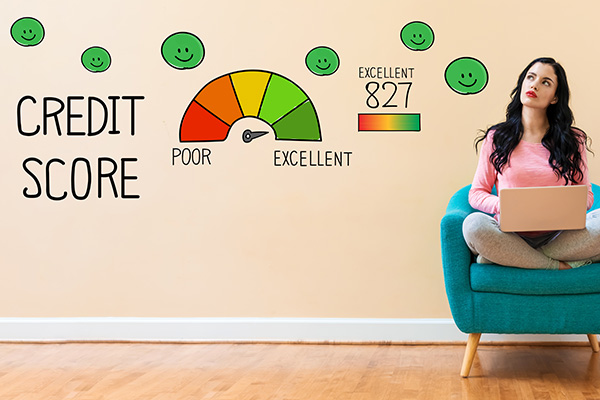4 Steps to Rebuild Your Credit and Qualify for a Personal Loan
9/23/2021
4 min. read
Rebuilding your credit score can be more complicated than starting from scratch, mainly because you have to prove to credit card issuers and lenders that you can and will make future payments despite slip-ups in the past. If you're not sure where to start, follow our four-step plan to begin your journey toward financial freedom.
Get a Credit Report and Dispute Errors
The best way to assess your current credit situation and start planning to rebuild your credit is to check your credit reports. Obtaining your credit reports is easy. Visit AnnualCreditReport.com and download a free report from each credit bureau (Equifax, TransUnion and Experian) once every 12 months. Due to the COVID-19 pandemic, you can access free weekly credit reports through April 2022.
Review your credit reports and make a list of the negative information you find, noting suspicious information or mistakes, such as incorrect account details, invalid late payments or accounts that don't belong to you. Dispute these claims and see if they can be removed from your credit report. Filing disputes and removing false information should be your first step to ensure you're starting with the cleanest slate possible.
Florida Credit Union is happy to provide our members with a free credit report analysis! Call or stop by your local branch to take advantage of this free service. Members also have access to their FICO® score within our online and mobile banking platform, FCU Anywhere.
Pay on Time, Every Time
Once you know where you stand with your credit score, the first step you can take to rebuild your credit score is to commit to pay your bills and lines of credit on time, every time. Even if you can only pay the minimum, on-time payments are a large part of how the bureaus calculate your credit score. A late payment will stay on your credit report for up to 7.5 years, so it’s essential to keep track of payment due dates and ensure you're making payments on or before the deadline.
Keep Your Credit Utilization Low
Credit utilization is the percentage of your credit card limit you're using. Your credit utilization percentage has a powerful effect on your credit score. Most finance experts recommend keeping your credit utilization below 30% of the limit on the card. For example, if your credit card has a limit of $5,000, you'll want to keep your balance below $1,500.
Check each of your lines of credit and see how close you are to hitting your credit limit. Then, focus on bringing the cards with the highest balances down first. Once your credit card issuer reports a lower balance to the credit bureaus, you will start to see your credit score improve.

Get Help with Debt
If you're struggling to pay your debt, it may be time to call in some reinforcements. You can ask a close friend or family member to let you be an authorized user on their credit cards. As your family or friends pay their bills on time, it will positively reflect on your credit and help boost your score; however, if they miss a payment, it will affect your credit score, too. Make sure to ask someone you trust who is responsible with their lines of credit.
Apply for a Personal Loan
If you’d prefer to not test your personal relationships, another option at your disposal is applying for a personal loan to help pay off your debt.
Here are two types of personal loans you can apply for to help you rebuild your credit:
Debt Consolidation Loan
Debt consolidation loans are one of the most popular and strategic uses of personal loans. If you have four credit cards and each has an outstanding balance, you’re making four separate payments each month with four different interest rates. A personal loan allows you to borrow the money to pay off all four cards and then pay back that loan with one payment per month, often with a much lower interest rate.
Debt consolidation loans will help improve your credit because you’ll pay off your credit card balances while improving your credit mix. Credit-scoring models like seeing a variety of debt, like credit cards and installment loans, so obtaining a personal loan helps diversify your debt, improving your credit score.
Credit-Builder Loan
Another personal loan, a credit-builder loan allows you to make fixed payments month over month toward the loan amount without receiving money in return. Once your entire loan is paid, plus interest, you receive your funding.
The benefit of a credit-builder loan is that you establish a history of timely payments, which the lender reports to the credit bureaus. It's like putting money into a savings account, but it positively impacts your credit score.
How to Qualify for a Personal Loan
Here are four standard requirements that financial institutions look at when evaluating loan applications:
- Credit Score & History - Most lenders require applicants to have a minimum score of around 600 to qualify for a personal loan, yet some lenders will lend to applicants without any credit history at all.
- Income - Lenders impose income requirements on borrowers to ensure they have the means to repay the new loan.
- Debt-To-Income Ratio (DTI) - DTI is a percentage representing the borrower's gross monthly income toward their monthly debt service. A DTI less than 36% is ideal.
- Collateral - Lenders will require you to pledge valuable assets (collateral) if you fall behind on payments or default your loan. Collateral for secured personal loans can include cash accounts, investment accounts, real estate and collectibles such as coins or precious metals.
Rebuilding your credit score takes time, so be patient. At Florida Credit Union, we want to help you achieve financial freedom by combatting your debts. Visit a branch or contact us to speak to one of our financial advisors about your options.

